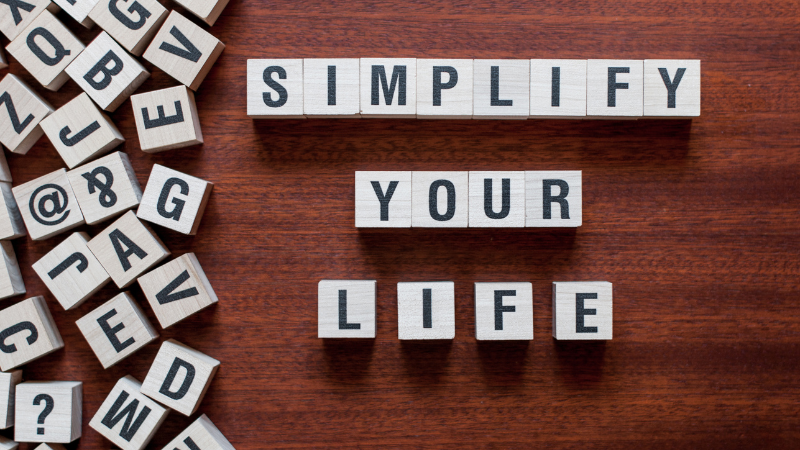Technology has revolutionized our lives and made possible things that seemed like Science Fiction fifty years ago.
Just think about it. People are carrying around powerful computers small enough to fit in their pockets; and they are able to instantly connect to billions of other computers all over the world through the Internet.
At the same time, technology has sped things up dramatically. Our lives are faster, more complex and more connected than ever before. And everything keeps changing at an ever growing pace.
That’s why it’s a good idea to slow down from time to time, take a step back and think about what really matters most in your life.
Henry David Thoreau said, “Our life is frittered away by detail – Simplify, simplify.”
How to Simplify Life
Here are five easy ways to help you simplify your life and focus on what matters most:
1. Make time to unplug and relax
Consultant Linda Stone came up with a concept called “continuous partial attention” to describe a state where our focus and attention are split over several different things at the same time.
She argues that we do this to ourselves because we are trying to stay connected in an attempt to avoid missing something important.
We are in a state of high alert and have our “antennas” up looking for opportunities and threats in our environment, even while we are busy doing other things. The problem is that when we are in this state, it’s very difficult to “unplug” and focus on a single thing at a time.
Being in a state of continuous partial attention and having our focus split also creates unnecessary stress and limits our ability to think creatively and make good decisions.
Some of the long-term effects of this state include burnout, stress, feeling anxious, feeling overwhelmed and overall having a lack of satisfaction with life.
These days, with our cell phone, pager, email, fax, instant message, internet browser, all right at our fingertips, it’s actually a challenge to truly unplug.
That’s why it’s important to consciously take time off to unplug from work. You need to be able to rest, relax and renew and that can’t happen if you are still stuck in a state of continuous partial attention.
Start by setting an unplug time each night where you will turn off your cell phone and stop checking email.
Each week spend at least one day completely unplugged from work and email.
While taking vacations, try to unplug completely for at least 48 hours straight. It’s better to unplug completely for 2 days, then check your email, and then unplug again for 2 more days than to check your email a little bit every day while you are taking time off.
2. Get rid of things you don’t want or need
Organizing guru, Peter Walsh, often talks about the draining effects that clutter can have on our lives.
We all tend to collect “stuff” as the years go by – it’s inevitable. Eventually some of that stuff sticks around too long and turns into clutter that has a negative impact on our wellbeing.
Even if the clutter is hiding away in a closet or drawer, it can still have a negative draining effect because of the lack of space it creates.
That’s why Peter Walsh recommends having a monthly decluttering routine where you focus on a specific part of your house or life each month and get rid of the clutter that you no longer want or need.
If you resonate with this idea, I highly recommend that you check out Peter Walsh’s book It’s All Too Much.
3. Clear out your “activity clutter”
This is very similar to the previous idea but instead of focusing on your space, the idea is to get rid of clutter around your activities and time.
Take a step back and look at all of the activities and commitments in your life. If you’re like most people, you will find at least one thing that has become a negative drain on your energy and time.
Maybe it was a good idea a few months ago, but if it’s no longer serving you there is no reason why you have to keep doing it forever.
Consider simplifying your life by letting go of activities or commitments that are just draining you without serving you.
If you are in the habit of taking on more than you can handle, then maybe you need to say NO more often so you have more time to do the things you really care about.
4. Put things into perspective
With the fast pace of life, it’s easy to get caught up in the small details and the hustle and bustle of our busy lives.
What can seem like an emergency in the moment often ends up being not that important.
When you find yourself feeling overwhelmed, pause for a moment and ask yourself a very simple question: “Will this really matter a year from now?”
If the answer is no then slow down, take a step back and try to regain some perspective.
5. Focus on one thing at a time
UC Irvine Professor Gloria Mark says that most people don’t actually have “work days” anymore, but rather a series of “work minutes” spread between random interruptions and distractions throughout the day.
For example, while studying a group of managers, developers, project managers and engineers, Professor Mark discovered that, on average, people switched from one task to an unrelated task (in a completely different project) every 10-12 minutes.
She also discovered that most of these interruptions were self-inflicted, where people would interrupt themselves without any external trigger.
Multitasking has become a habit for many people, but it’s a habit that you can change.
Focusing on one thing at a time helps you simplify your work and avoid overwhelmed by trying to do too many things at once.



